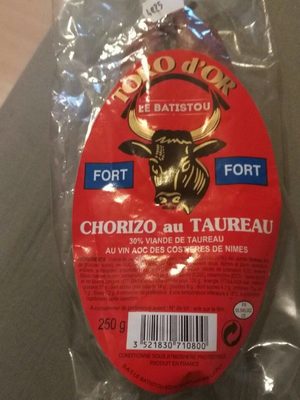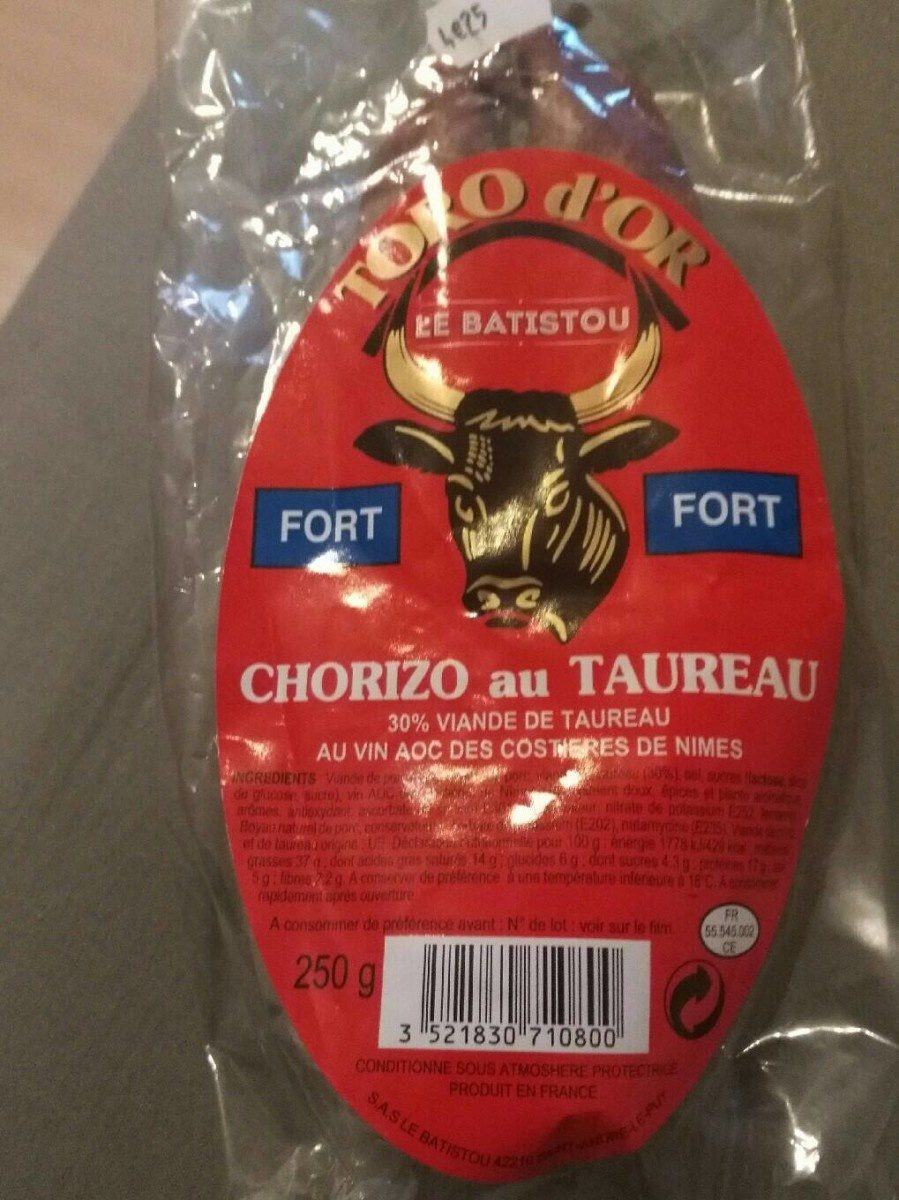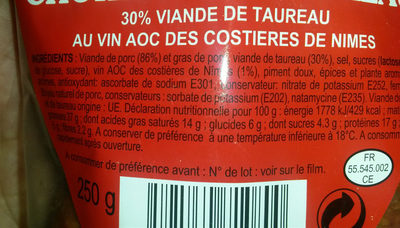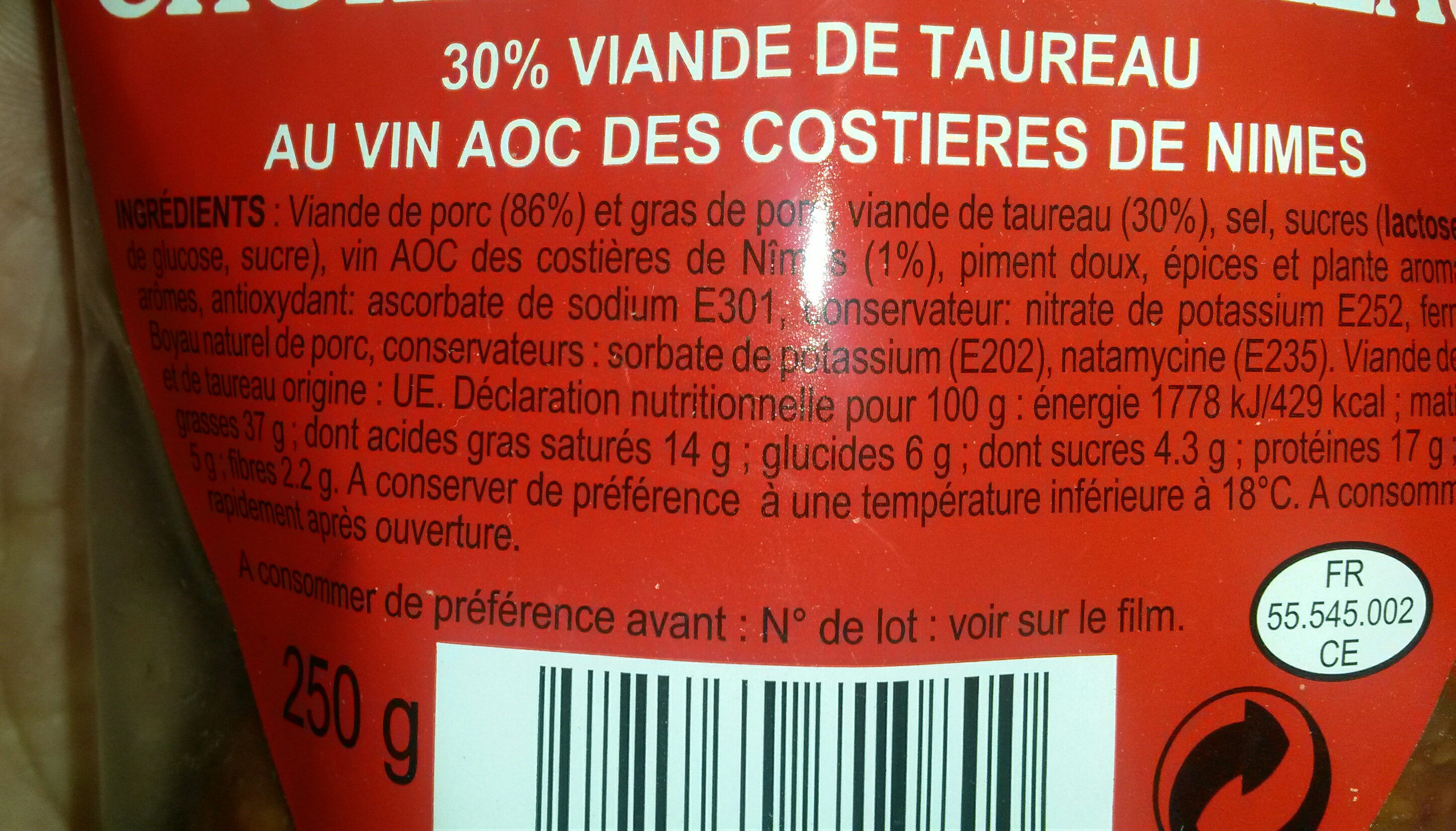Help us make food transparency the norm!
As a non-profit organization, we depend on your donations to continue informing consumers around the world about what they eat.
The food revolution starts with you!
Chorizo au taureau - Le Batistou
Chorizo au taureau - Le Batistou
This product page is not complete. You can help to complete it by editing it and adding more data from the photos we have, or by taking more photos using the app for Android or iPhone/iPad. Thank you!
×
Barcode: 3521830710800 (EAN / EAN-13)
Brands: Le Batistou
Categories: Meats and their products, Meats, Prepared meats, Cured sausages, Chorizo
Labels, certifications, awards:
Green Dot, fr:AOC
Traceability code: FR 55.545.002 CE - Verdun (Meuse, France)
Countries where sold: France
Matching with your preferences
Health
Ingredients
-
23 ingredients
French: Viande de porc (86%) et gras de porc, viande de taureau (30%), sel, sucres (lactose, sirop de glucose, sucre), vin AOC des costières de Nîmes (1%), piment doux, épices et plante aromatique, arômes, antioxydant: ascorbate de sodium E301, conservateur: nitrate de potassium E252, ferments. Boyau naturel de porc, conservateurs: sorbate de potassium (E202), natamycine (E235)Allergens: Milk
Food processing
-
Ultra processed foods
Elements that indicate the product is in the 4 - Ultra processed food and drink products group:
- Ingredient: Flavouring
- Ingredient: Glucose
- Ingredient: Glucose syrup
- Ingredient: Lactose
Food products are classified into 4 groups according to their degree of processing:
- Unprocessed or minimally processed foods
- Processed culinary ingredients
- Processed foods
- Ultra processed foods
The determination of the group is based on the category of the product and on the ingredients it contains.
Additives
-
E202 - Potassium sorbate
Potassium sorbate (E202) is a synthetic food preservative commonly used to extend the shelf life of various food products.
It works by inhibiting the growth of molds, yeast, and some bacteria, preventing spoilage. When added to foods, it helps maintain their freshness and quality.
Some studies have shown that when combined with nitrites, potassium sorbate have genotoxic activity in vitro. However, potassium sorbate is generally recognized as safe (GRAS) by regulatory authorities.
-
E235 - Natamycin
Natamycin: Natamycin, also known as pimaricin, is an antifungal medication used to treat fungal infections around the eye. This includes infections of the eyelids, conjunctiva, and cornea. It is used as eyedrops. Natamycin is also used in the food industry as a preservative.Allergic reactions may occur. It is unclear if medical use during pregnancy or breastfeeding is safe. It is in the macrolide and polyene families of medications. It results in fungal death by altering the cell membrane.Natamycin was discovered in 1955 and approved for medical use in the United States in 1978. It is on the World Health Organization's List of Essential Medicines, the most effective and safe medicines needed in a health system. The wholesale cost in the developing world is between US$92.90 and 126.72 per 5-ml bottle as of 2015. It is produced by fermentation of the bacterium Streptomyces natalensis.Source: Wikipedia
-
E252 - Potassium nitrate
Potassium nitrate: Potassium nitrate is a chemical compound with the chemical formula KNO3. It is an ionic salt of potassium ions K+ and nitrate ions NO3−, and is therefore an alkali metal nitrate. It occurs in nature as a mineral, niter. It is a source of nitrogen, from which it derives its name. Potassium nitrate is one of several nitrogen-containing compounds collectively referred to as saltpeter or saltpetre. Major uses of potassium nitrate are in fertilizers, tree stump removal, rocket propellants and fireworks. It is one of the major constituents of gunpowder -black powder- and has been used since the Middle Ages as a food preservative.Source: Wikipedia
-
E301 - Sodium ascorbate
Sodium ascorbate: Sodium ascorbate is one of a number of mineral salts of ascorbic acid -vitamin C-. The molecular formula of this chemical compound is C6H7NaO6. As the sodium salt of ascorbic acid, it is known as a mineral ascorbate. It has not been demonstrated to be more bioavailable than any other form of vitamin C supplement.Sodium ascorbate normally provides 131 mg of sodium per 1‚000 mg of ascorbic acid -1‚000 mg of sodium ascorbate contains 889 mg of ascorbic acid and 111 mg of sodium-. As a food additive, it has the E number E301 and is used as an antioxidant and an acidity regulator. It is approved for use as a food additive in the EU, USA, and Australia and New Zealand.In in vitro studies, sodium ascorbate has been found to produce cytotoxic effects in various malignant cell lines, which include melanoma cells that are particularly susceptible.Source: Wikipedia
Ingredients analysis
-
May contain palm oil
Ingredients that may contain palm oil: Pork fat
-
Non-vegan
Non-vegan ingredients: Pork meat, Pork fat, Bull meat, Lactose, fr:Boyau naturel de porcSome ingredients could not be recognized.
We need your help!
You can help us recognize more ingredients and better analyze the list of ingredients for this product and others:
- Edit this product page to correct spelling mistakes in the ingredients list, and/or to remove ingredients in other languages and sentences that are not related to the ingredients.
- Add new entries, synonyms or translations to our multilingual lists of ingredients, ingredient processing methods, and labels.
If you would like to help, join the #ingredients channel on our Slack discussion space and/or learn about ingredients analysis on our wiki. Thank you!
-
Non-vegetarian
Non-vegetarian ingredients: Pork meat, Pork fat, Bull meat, fr:Boyau naturel de porcSome ingredients could not be recognized.
We need your help!
You can help us recognize more ingredients and better analyze the list of ingredients for this product and others:
- Edit this product page to correct spelling mistakes in the ingredients list, and/or to remove ingredients in other languages and sentences that are not related to the ingredients.
- Add new entries, synonyms or translations to our multilingual lists of ingredients, ingredient processing methods, and labels.
If you would like to help, join the #ingredients channel on our Slack discussion space and/or learn about ingredients analysis on our wiki. Thank you!
-
Details of the analysis of the ingredients
We need your help!
Some ingredients could not be recognized.
We need your help!
You can help us recognize more ingredients and better analyze the list of ingredients for this product and others:
- Edit this product page to correct spelling mistakes in the ingredients list, and/or to remove ingredients in other languages and sentences that are not related to the ingredients.
- Add new entries, synonyms or translations to our multilingual lists of ingredients, ingredient processing methods, and labels.
If you would like to help, join the #ingredients channel on our Slack discussion space and/or learn about ingredients analysis on our wiki. Thank you!
fr: Viande de porc 86%, gras de porc, viande de taureau 30%, sel, sucres (lactose, sirop de glucose, sucre), vin des costières de Nîmes 1%, piment doux, épices et plante aromatique, arômes, antioxydant (ascorbate de sodium e301), conservateur (nitrate de potassium e252), ferments, Boyau naturel de porc, conservateurs (sorbate de potassium (e202)), natamycine (e235)- Viande de porc -> en:pork-meat - vegan: no - vegetarian: no - ciqual_proxy_food_code: 28205 - percent: 86
- gras de porc -> en:pork-fat - vegan: no - vegetarian: no - from_palm_oil: maybe - ciqual_food_code: 16530
- viande de taureau -> en:bull-meat - vegan: no - vegetarian: no - percent: 30
- sel -> en:salt - vegan: yes - vegetarian: yes - ciqual_food_code: 11058
- sucres -> en:sugar - vegan: yes - vegetarian: yes - ciqual_proxy_food_code: 31016
- lactose -> en:lactose - vegan: no - vegetarian: yes
- sirop de glucose -> en:glucose-syrup - vegan: yes - vegetarian: yes - ciqual_proxy_food_code: 31016
- sucre -> en:sugar - vegan: yes - vegetarian: yes - ciqual_proxy_food_code: 31016
- vin des costières de Nîmes -> fr:vin-des-costieres-de-nimes - labels: fr:aoc - percent: 1
- piment doux -> fr:piment-doux - vegan: yes - vegetarian: yes - ciqual_food_code: 20151
- épices et plante aromatique -> en:herbs-and-spices - vegan: yes - vegetarian: yes
- arômes -> en:flavouring - vegan: maybe - vegetarian: maybe
- antioxydant -> en:antioxidant
- ascorbate de sodium e301 -> en:e301 - vegan: yes - vegetarian: yes
- conservateur -> en:preservative
- nitrate de potassium e252 -> en:e252 - vegan: yes - vegetarian: yes
- ferments -> en:ferment - vegan: maybe - vegetarian: maybe
- Boyau naturel de porc -> fr:boyau-naturel-de-porc - vegan: no - vegetarian: no
- conservateurs -> en:preservative
- sorbate de potassium -> en:e202 - vegan: yes - vegetarian: yes
- e202 -> en:e202 - vegan: yes - vegetarian: yes
- sorbate de potassium -> en:e202 - vegan: yes - vegetarian: yes
- natamycine -> en:e235 - vegan: yes - vegetarian: yes
- e235 -> en:e235 - vegan: yes - vegetarian: yes
Nutrition
-
Bad nutritional quality
⚠ ️Warning: the amount of fiber is not specified, their possible positive contribution to the grade could not be taken into account.⚠ ️Warning: the amount of fruits, vegetables and nuts is not specified on the label, it was estimated from the list of ingredients: 0This product is not considered a beverage for the calculation of the Nutri-Score.
Positive points: 0
- Proteins: 5 / 5 (value: 17, rounded value: 17)
- Fiber: 0 / 5 (value: 0, rounded value: 0)
- Fruits, vegetables, nuts, and colza/walnut/olive oils: 0 / 5 (value: 0, rounded value: 0)
Negative points: 25
- Energy: 5 / 10 (value: 1795, rounded value: 1795)
- Sugars: 0 / 10 (value: 4.3, rounded value: 4.3)
- Saturated fat: 10 / 10 (value: 14, rounded value: 14)
- Sodium: 10 / 10 (value: 2000, rounded value: 2000)
The points for proteins are not counted because the negative points are greater or equal to 11.
Nutritional score: (25 - 0)
Nutri-Score:
-
Nutrient levels
-
Fat in high quantity (37%)
What you need to know- A high consumption of fat, especially saturated fats, can raise cholesterol, which increases the risk of heart diseases.
Recommendation: Limit the consumption of fat and saturated fat- Choose products with lower fat and saturated fat content.
-
Saturated fat in high quantity (14%)
What you need to know- A high consumption of fat, especially saturated fats, can raise cholesterol, which increases the risk of heart diseases.
Recommendation: Limit the consumption of fat and saturated fat- Choose products with lower fat and saturated fat content.
-
Sugars in low quantity (4.3%)
What you need to know- A high consumption of sugar can cause weight gain and tooth decay. It also augments the risk of type 2 diabetes and cardio-vascular diseases.
Recommendation: Limit the consumption of sugar and sugary drinks- Sugary drinks (such as sodas, fruit beverages, and fruit juices and nectars) should be limited as much as possible (no more than 1 glass a day).
- Choose products with lower sugar content and reduce the consumption of products with added sugars.
-
Salt in high quantity (5%)
What you need to know- A high consumption of salt (or sodium) can cause raised blood pressure, which can increase the risk of heart disease and stroke.
- Many people who have high blood pressure do not know it, as there are often no symptoms.
- Most people consume too much salt (on average 9 to 12 grams per day), around twice the recommended maximum level of intake.
Recommendation: Limit the consumption of salt and salted food- Reduce the quantity of salt used when cooking, and don't salt again at the table.
- Limit the consumption of salty snacks and choose products with lower salt content.
-
-
Nutrition facts
Nutrition facts As sold
for 100 g / 100 mlCompared to: Chorizo Energy 1,795 kj
(429 kcal)+6% Fat 37 g +10% Saturated fat 14 g +9% Carbohydrates 6 g +134% Sugars 4.3 g +207% Fiber ? Proteins 17 g -24% Salt 5 g +46% Fruits‚ vegetables‚ nuts and rapeseed‚ walnut and olive oils (estimate from ingredients list analysis) 0 % Carbon footprint from meat or fish 636.4 g
Environment
-
Eco-Score E - Very high environmental impact
⚠ ️Select a country in order to include the full impact of transportation.The Eco-Score is an experimental score that summarizes the environmental impacts of food products.→ The Eco-Score was initially developped for France and it is being extended to other European countries. The Eco-Score formula is subject to change as it is regularly improved to make it more precise and better suited to each country.Life cycle analysis
-
Average impact of products of the same category: D (Score: 35/100)
Category: Spicy pork sausage with red pepper, no precision
Category: Spicy pork sausage with red pepper, no precision
- PEF environmental score: 0.89 (the lower the score, the lower the impact)
- including impact on climate change: 6.17 kg CO2 eq/kg of product
Stage Impact Agriculture
78.5 %Processing
14.4 %Packaging
0.5 %Transportation
1.8 %Distribution
1.0 %Consumption
3.8 %
Bonuses and maluses
-
Missing origins of ingredients information
Malus: -5
⚠ ️ The origins of the ingredients of this product are not indicated.
If they are indicated on the packaging, you can modify the product sheet and add them.
If you are the manufacturer of this product, you can send us the information with our free platform for producers.
-
Missing packaging information for this product
Malus: -15
⚠ ️ The information about the packaging of this product is not filled in.⚠ ️ For a more precise calculation of the Eco-Score, you can modify the product page and add them.
If you are the manufacturer of this product, you can send us the information with our free platform for producers.
Eco-Score for this product
-
Impact for this product: E (Score: 15/100)
Product: Chorizo au taureau - Le Batistou
Life cycle analysis score: 35
Sum of bonuses and maluses: -20
Final score: 15/100
-
Carbon footprint
-
Equal to driving 3.2 km in a petrol car
617 g CO² per 100g of product
The carbon emission figure comes from ADEME's Agribalyse database, for the category: Spicy pork sausage with red pepper, no precision (Source: ADEME Agribalyse Database)
Stage Impact Agriculture
82.7 %Processing
10.3 %Packaging
1.6 %Transportation
3.3 %Distribution
0.6 %Consumption
1.5 %
Packaging
-
Missing packaging information for this product
⚠ ️ The information about the packaging of this product is not filled in.Take a photo of the recycling information Take a photo of the recycling information
Transportation
-
Origins of ingredients
Missing origins of ingredients information
⚠ ️ The origins of the ingredients of this product are not indicated.
If they are indicated on the packaging, you can modify the product sheet and add them.
If you are the manufacturer of this product, you can send us the information with our free platform for producers.Add the origins of ingredients for this product Add the origins of ingredients for this product
Report a problem
-
Incomplete or incorrect information?
Category, labels, ingredients, allergens, nutritional information, photos etc.
If the information does not match the information on the packaging, please complete or correct it. Open Food Facts is a collaborative database, and every contribution is useful for all.
Data sources
Product added on by kiliweb
Last edit of product page on by naruyoko.
Product page also edited by autorotate-bot, charlesnepote, openfoodfacts-contributors, roboto-app, vmeurisse, yuka.Wkk1YUFiOVpyOE1KaGZZY3dRajY1b0o2NmJhUlJtL25NUEJKSUE9PQ.










